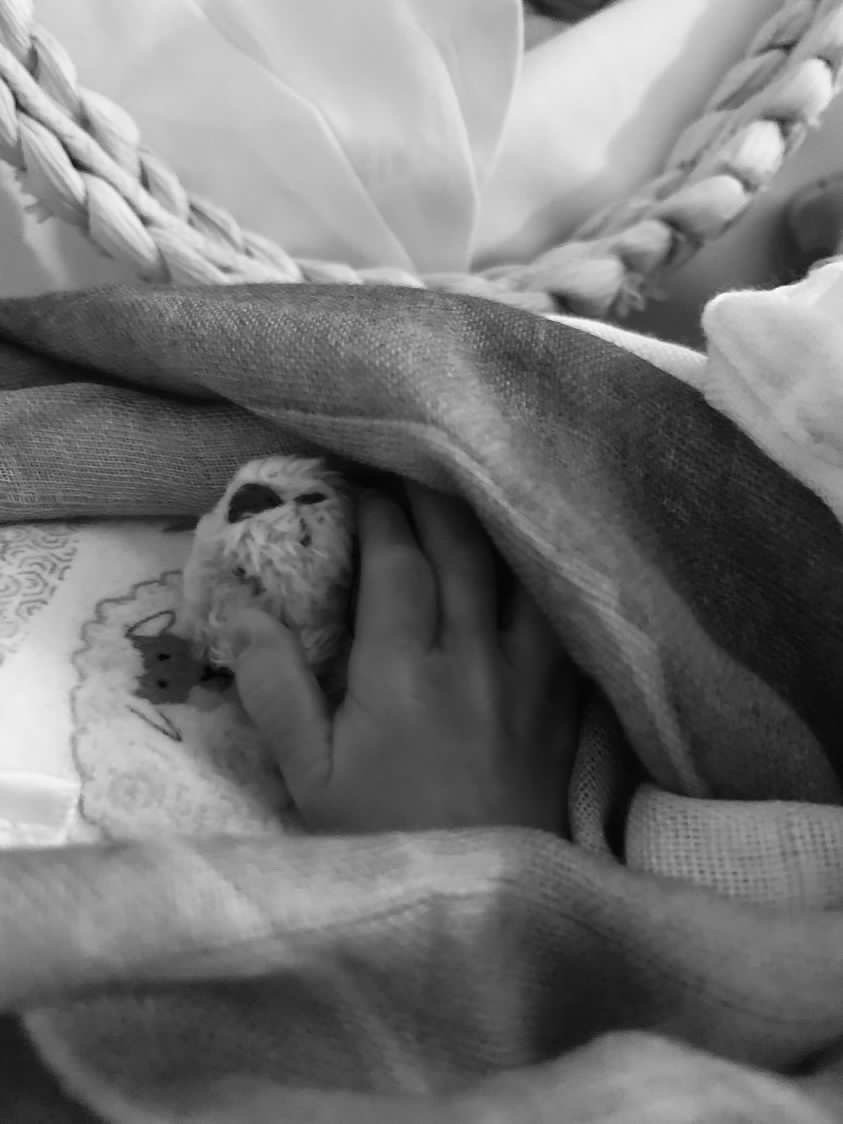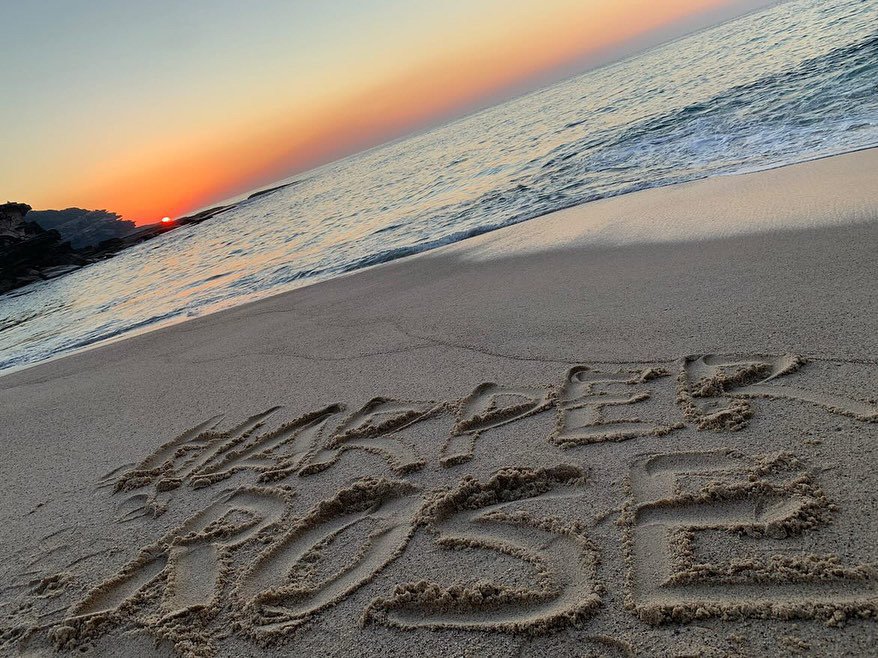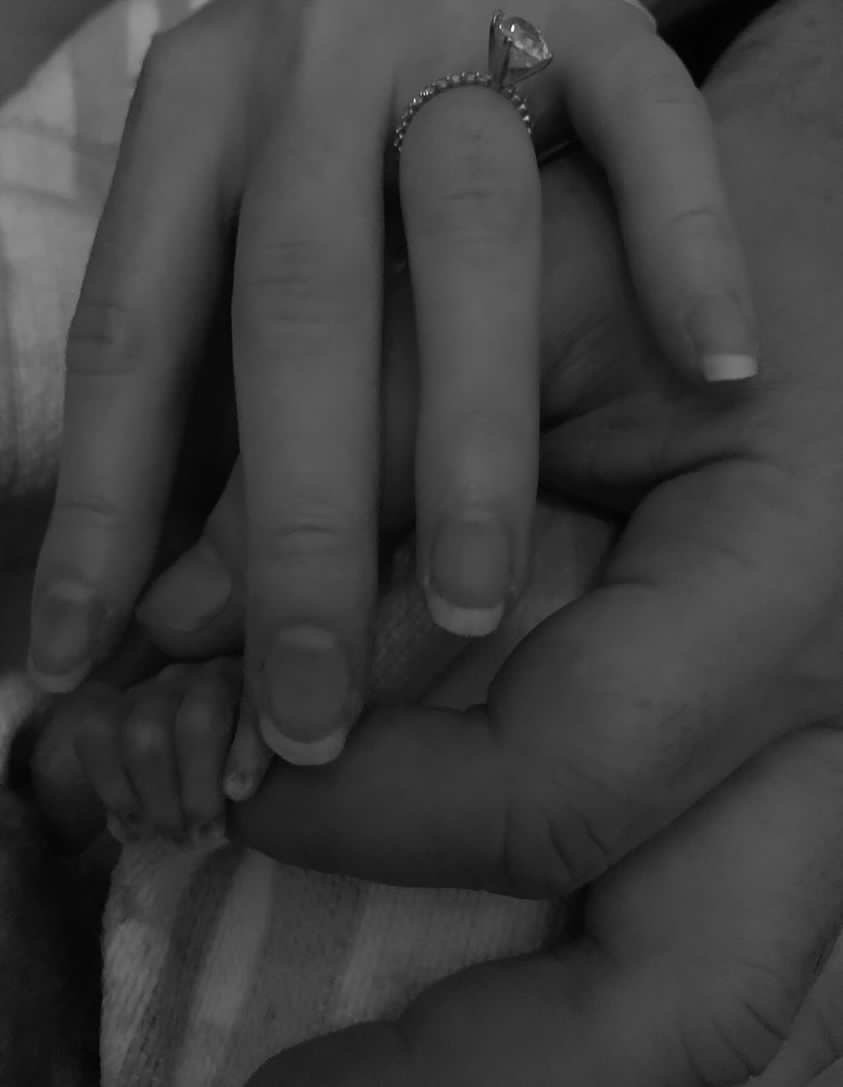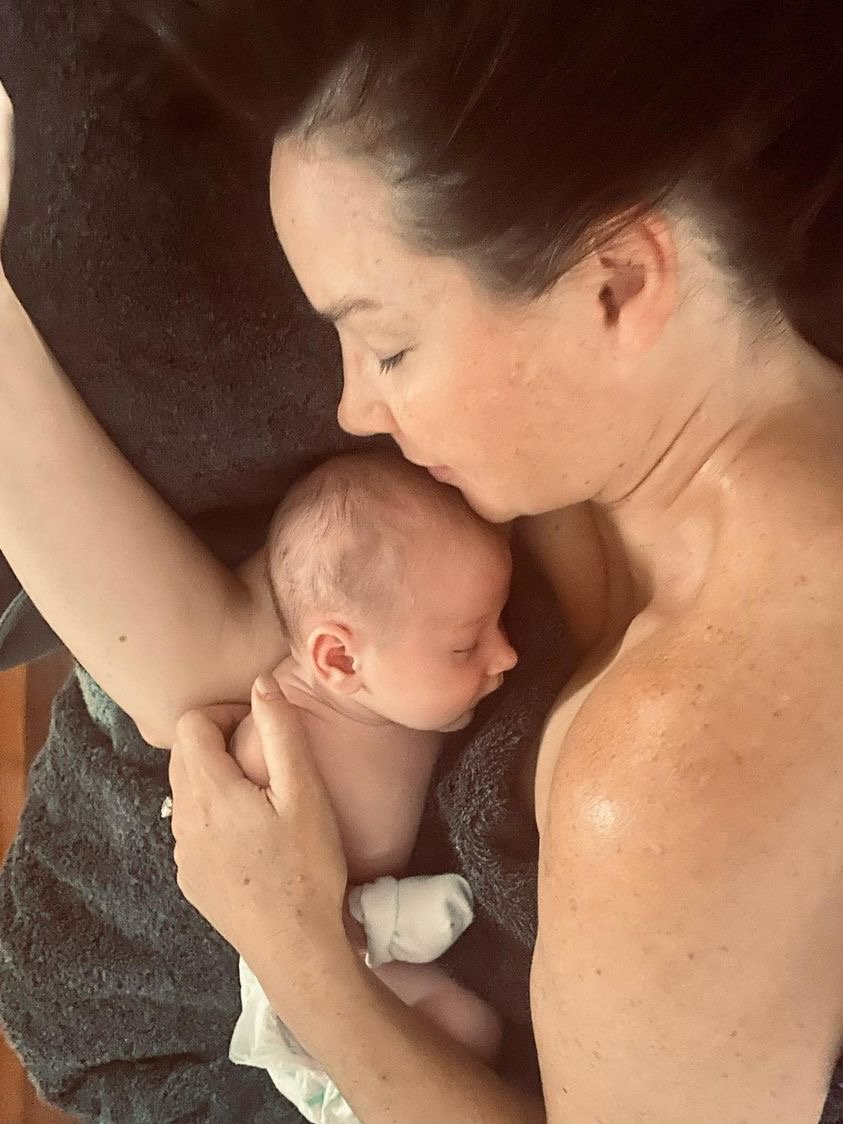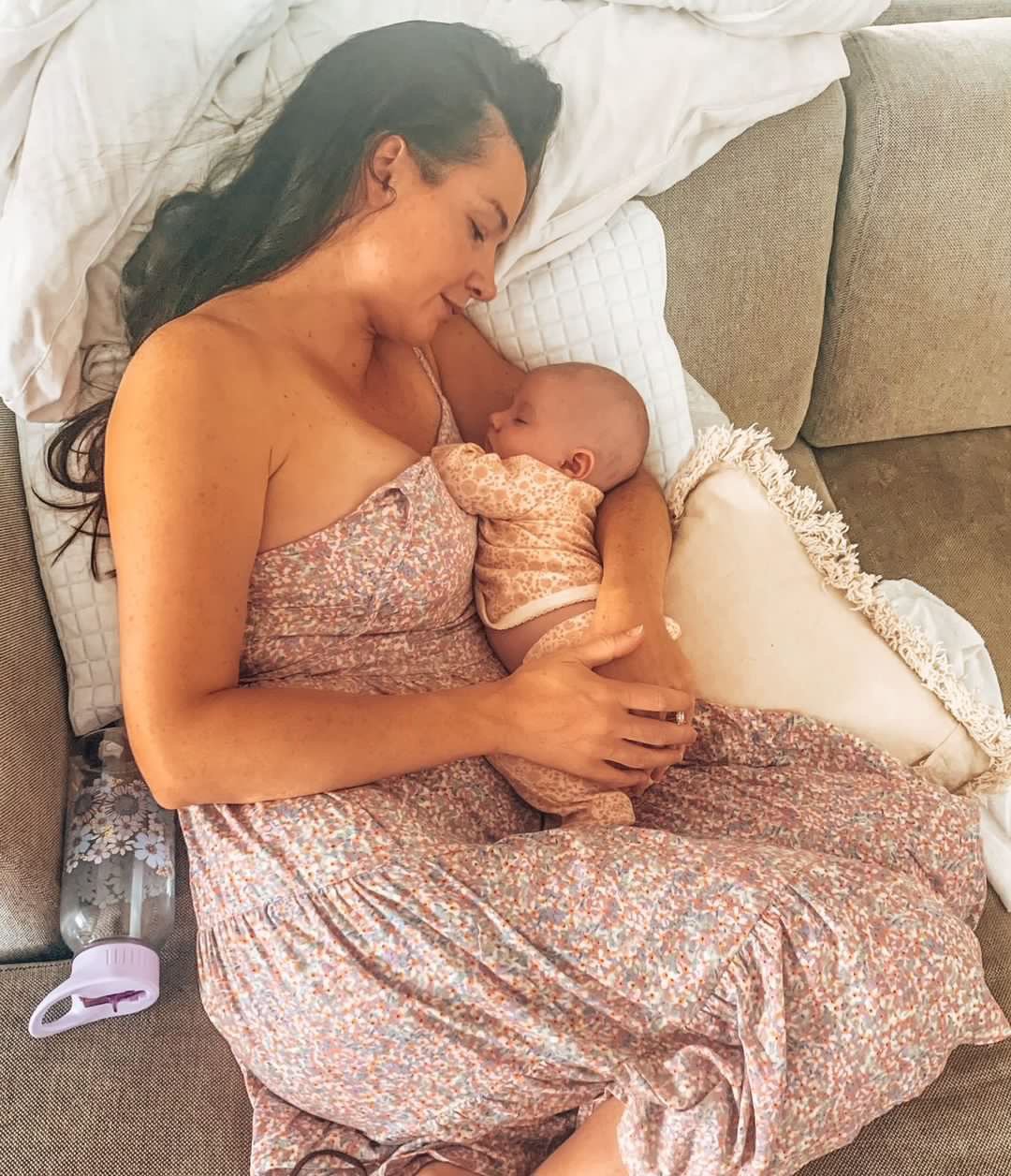13 | Jade
“That was my rock bottom. It was very distinct - sitting in bed in a dark room with River screaming, thinking, ‘how do I not wake up tomorrow?’... That was my rock bottom, that not wanting to wake up the next day. I have never even felt that, even after Harper. So that was really scary for me. I had nothing left to give... And just thank goodness people came to my rescue, because I don’t actually know what would have happened in those following days.”
As Jade says, she has never shied away from sharing uncomfortable stories, and her story of bringing a baby earthside is no exception. While the birth of her daughter, River, seemingly gave her the ‘happy ending’ she so desperately wanted, her journey with uncomfortable stories did not end there.
Instead of the new-born bubble she envisioned for so long, Jade had to walk on eggshells around her baby who constantly screamed. The magnitude of her grief and anxiety was only compounded by River’s colic, causing a ‘crash’ that shattered her nervous system. After three years of back-to-back experiences with an ectopic pregnancy, baby loss, and miscarriage, Jade had nothing left to give.
It was Jade’s mother-in-law who read between the lines of a text message and flew down the same day to take Jade to the doctors to ensure she finally started to receive the help she needed.
I invite you to join me in this episode as Jade shares her truth and the purpose she has found in her pain - featuring grief, anxiety, depression, colic, talk therapy, and medication, as well as the many connections she has made along the way that have held her with love during this journey.
Please note, this episode discusses baby loss and mentions TFMR. You can find Jade @heart.of.harper on Instagram where she raises awareness, educates, and holds space for the uncomfortable experiences that can come with conceiving a baby and life after loss.
I thank Jade from the bottom of my heart for shining a light on the uncomfortable stories we often keep to ourselves.
“For women to be able to share uncomfortable stories…. Not everyone wants to hear them all the time but I think it’s really important that we talk about them.”
“I have a beautiful little family - so my partner is Craig, we have two beautiful daughters, our first being Harper who is no longer earthside but always with us every step of the way on this journey, and then we have River who is her baby sister born in November last year.”
“And then we have Reef who makes a regular appearance on Instagram as well and he’s very loved! He was our little emotional support addition to the family after Harper left us and very much helped carry us through that grief so he very much feels like one of our children.”
“I have always been a really anxious person, prior to starting a family, prior to my experiences with baby loss, so I was probably a prime candidate for being hit with postnatal anxiety as well.”
“So always had that, never officially diagnosed, like it’s never been debilitating as such, and I’ve never had to be on medication or really had ongoing therapy for it but I’m just aware that I’m quite an anxious person.”
“And our journey has certainly magnified that, to have gone through what we have already being an anxious person has been very, very testing.”
“Even when you’re trying to conceive every month, you’re super anxious waiting for that two-week wait and that pregnancy test.”
“My first pregnancy was an ectopic so then that obviously magnified the anxiety I felt in trying to conceive after that. And then going into Harper’s pregnancy, yes I was very anxious because I’d experienced loss already and didn’t know what to expect.”
“I really did sort of start to relax though after the 13-week NIPT test, which I know many, many people say. When you don’t have the full picture of what else could potentially go wrong or happen, you very much feel like that’s a safe zone.”
“So then we got to our 20-week scan with Harper and that’s where we discovered there was a very significant brain abnormality on her scan and what continued from there was eight weeks of waiting, tests, not knowing what the outcome would be, not knowing what her fate would be.”
“So you can only imagine the anxiety that you carry every single day carrying a baby that you don’t know will make it, will be ok, what the outcome will be. You’re Googling every day - which is not an anxious person’s friend!”
“I've always thought I'm quite a resilient person. I've survived a divorce where my partner had an affair for two years after twelve years together. I pulled myself out of that, I pulled myself out of the ectopic, but I just went, ‘No, this is bigger than me. Like, I need professional support.’”
“So I engaged a therapist who actually had a last minute appointment pop up the day before Harper was born, which was kind of meant to be and very much needed. And she really helped me through that whole traumatic experience. And I didn't develop PTSD, which was the biggest concern - I think because I was having such regular and ongoing therapy.”
“But, again, that was me driving that. So no one was really picking up the phone saying, ‘organise a therapist, you're going to need this etc.’”
“I kind of look back and think 'if I hadn't been a person that's quite proactive in organising my own support, would I have gotten any? Or would anyone have pushed enough?’ And I certainly think that's an opportunity in the system for opening the space for support.”
“It's a really emotional topic, because I think when you experience it, you think about all of the poor women out there that aren't getting the help that they need and the potentially catastrophic results from that.”
“I think that there are incredible services available, but what I hear from people is that they're under-resourced and underfunded, so they're doing their best, but the fact there are wait times for people to receive support that they need yesterday is really, really concerning.”
In addition to therapy, Jade credits connection and social media for helping her through Harper’s loss. “Connection is so important in this community. And I think that's why social media has really helped carry a lot of people through their loss. Because you sort of have these people in your life prior to loss who do their very best and mean well, but can't always help carry you in the way that other loss people can because you don't need to explain your pain to those people. They just get it.”
“It's really exhausting, I think, trying to convey the magnitude of loss to others. You end up carrying a lot of those people on your shoulders because they say or do the wrong thing, even if they mean well, whereas your loss community online - or that you end up eventually meeting in person - just get it. And it's like you can breathe sort of when you're speaking to them, because you can just be honest and be yourself and share some really ugly, dark thoughts and feelings without judgement that might scare other people.”
“I was laying in bed a couple of days after Harper was born and I said, ‘I need to share her online’ to my partner… It was like this inner knowing and this pull… And what has evolved from that has been this space where I can just be my honest, raw, ugly self at times. Like, really writing my grief helps me release that energy that I'm storing in my body.”
“So it started off by helping me, and then it would just be more followers, more messages, more connection, more story sharing, and it started to help others and I was like, this feels good. I feel like Harper has a bigger purpose. This is giving purpose to my pain, which has been very therapeutic for me.”
“And it's just evolved into people around the world knowing about Harper and saying that she shows up for them during difficult times and it helps keep her memory alive, which is very healing for me. I've created some beautiful friendships through social media and the loss community. So I would actually say that's probably been the biggest coping support for me alongside my friends that already existed who have been there through everything.”
Starting fundraisers straight away also “just gave me something to do that brought love back into the pain.”
“So I would say that the anxiety I felt over that time was probably one of the worst I’ve ever had in my life, and it’s certainly not dropped since then. We went from Harper into River’s pregnancy, and the anxiety there was just constant until she arrived - it was nine months of living in anxiety, which any mother experiencing pregnancy after loss in particular will attest to.”
“I can obviously only speak for my own experience, but I think the anxiety is so big when you’ve experienced the pain because your mind wants to protect you from ever having to experience something so horrific again, so it’s in fight-or-flight.”
“And yeah it is that discomfort with uncertainty, I’m a very controlling person - not of others, but I like control, I like to know outcomes - and I very much tried to navigate that but I think some experiences are just too big for you to be able to ever fully surrender and be at peace with not knowing.”
“Yeah River’s pregnancy certainly wasn’t one where I could just let go and surrender to what was going to be. I think your system is so shot by the bad luck - for lack of a better phrase - that we’ve experienced that even when you got that momentary reassurance in a scan, everything felt too good to be true!”
“Any time in the past we had rested in a state of oh this is good, the rug was pulled from beneath us. So it’s very scary to allow yourself to sit in a place of comfort and be ok with what’s happening because you are constantly trying to protect yourself.”
“River’s pregnancy, even though it feels like lifetimes ago already, it was horrendous in that from the moment we conceived her, we didn’t know if we would get to keep her.”
“And I had to wait sixteen weeks to have a scan that would ultimately tell me whether she had inherited the same genetic disorder as Harper, and sixteen weeks is a really long time to wait to find out if you will lose another baby, have to birth another baby and say goodbye, or potentially get to bring them earthside.”
“I can’t even tell you what it feels like to wake up that day that you go to the hospital to have that scan, like how you actually navigate that anxiety! I don’t even remember a lot of that morning, I think the brain just disconnects, it’s just too big to carry.”
“The best I could do to cope with a lot of that uncertainty was try and get control where I could.”
“With River, you know you get the baby in your arms and you sort of think oh I know she’s here now and she’s alive and safe! But it still doesn’t end because then it becomes what if there’s something they didn’t find with her in utero? What if she develops something in these early weeks that’s catastrophic? Or what if she’s not going to be ok and we just didn’t know?”
“I was very triggered even in those first few days in the hospital… just constantly waiting for someone to tell me that something’s wrong.” The hearing test and a visit from the paediatrician to assess River’s fontanelle was enough to cause Jade to panic. “I was sitting in bed trembling.”
“So it’s a real mental battle every day to kind of try and pull yourself out of that worry.”
“Then the anxiety manifested because we had some, I wouldn’t say ‘feeding issues’ but weight gain stuff in those first two weeks which I didn’t realise was so common. And I think it’s really important that people - such as lactation experts or the community nurses that come to visit - that they’re really careful with the language they use because I kind of was made to feel like it was a really big deal and potentially catastrophic so my brain just spiralled.”
“Then I went and spent hundreds on consultants to come and tell me that her latch is fine!”
“But then you go on a feeding plan where it’s like every two hours during the night you’re waking them up, you’re feeding them, you’re expressing and topping up with breastmilk, and then you’re topping up with a formula bottle. And then she started making these huge gains of like 300g a week when they want between 150 and 200g. And I’m like, what was the anxiety need around that?”
“I’d spent two weeks just terrified that she wasn’t healthy or I wasn’t doing enough. So the anxiety sort of continued through that process.”
“At week three is when her colic kicked in.”
“Her colic has given me the worst anxiety that I’ve ever experienced in my life, and that’s not River’s fault, it’s the colic, it’s not her, it’s the experience of the colic, and that’s what has now manifested into my postnatal anxiety.”
“So yeah, it’s been one thing after another with the anxiety.”
“I think looking back, I was such a prime candidate for postnatal anxiety. If I really look at the last three years in particular, it’s going from an ectopic, into Harper’s loss, into an early miscarriage, into River’s pregnancy, into a baby with colic.”
“My nervous system is completely shot and I know that’s the experience for many others, it’s years of gruelling experiences one after another without really a break because when you are on the journey to conceiving a baby you don’t want to stop, you need to get to that end or that happy ending! But you don’t really give your body or your mind a break from it all, it’s just continuous, and then there’s going to come a point where you come crashing down - and that’s certainly what happened to me in the last few weeks.”
“So when we brought River home and things were pretty good for three weeks, we were just navigating the feeding stuff and sure, you're tired. I'd expected that. I will admit, though, it hits you like a freight train, like you don't know what sleep deprivation feels like. It is used as a method of torture for a reason. But we park that because that's, as I'll say, like ‘normal’ newborn experiences. It's really hard, but you adjust.”
“But then, yeah, from this three-week period, River started to display some behaviour where it was just like walking on eggshells, she would just cry at the drop of a hat. Holding her through naps, she would start squirming and kicking and waking up while in a deep sleep in what looked and sounded like agony, like pain-screaming. So not just a grizzle, we're talking like bloody murder screaming here.”
“I started to sort of say to myself, ‘why do I not like this experience? Why am I not enjoying this? Is this baby blues? Is this postnatal depression? Like, what is this?’”
“So I was like, ‘this is really shit. This is really hard. Is it really meant to be this hard?’ And I was really beating myself up about it. I was like, ‘why am I hating this?’ And that's the brutal honesty. I was hating it.”
After some investigation, Jade was told River had colic.
“When I try to articulate the lived experience of colic, I don't feel like I do it justice.”
“So your nervous system gets really, really shot and uncomfortable in hearing your own baby cry. You're wired to respond to that. So when you have a baby that is screaming at the top of their lungs for hours, and hours and hours on end, nothing typically works to settle them… It is just unexplainable crying that nothing really soothes.”
“And you think about dealing with that every single day and night for three months of your life. As the mother, in my experience, you don't really get a physical break from that because the baby gets worse with someone else. So even my partner could barely take her from me for three months because she would scream even more. And so I just wouldn't bother because I knew that that was probably going to make her worse, which was the last thing I wanted.”
“So for the first three months, I pretty much sat in a dark room, starving, thirsty, needing to go to the bathroom, holding her, screaming. And yeah, what that does to your brain and your nervous system is something I can't actually explain.”
“I was too scared to leave the house because if I blinked the wrong way, she might start screaming and it would go on for hours. So you're constantly walking on eggshells trying not to set your baby off.”
“It's very difficult to bond with your baby when they're just screaming and you love them more than anything, but you are exhausted and frustrated with your baby. And I'll speak openly and honestly about that because it's a yucky feeling to feel as their mother, but you want it to stop and you want to break and it just doesn't.”
“And every night you go to bed and you know that the next day you have to do it all over again and you wonder how!”
“I'm very much a person that needs solutions to problems, so you give me a problem like colic - which isn't even a diagnosis, it's just a term used to say we have no freaking idea what this is! - And you're spending thousands on appointments and natural therapies and trying everything and getting in the car and going to these appointments. You're driving with tears running down your face because your baby's screaming in the back of the car like they're about to die and stop breathing. You're pulling over on highways to get them out. Like it is just horrendous!”
“And what it does to your relationship is a whole other ballgame.”
“We are quite isolated from friends and family in that we moved down south and the majority of our support network is in Sydney, so that sort of after-work drop-in from parents to help clean or cook or something just wasn't readily available. Even though people did their best, obviously, that was really isolating.”
“I couldn't even put River on the floor for a little bit of playtime, she would just scream… it's amazing what you learn to do with one hand, like going to the toilet, holding her, trying to prep a meal, just crazy stuff. And, yeah, it's very intense. I think the pressure of knowing they only want you is even bigger than the fact that you're holding them because you know you can't put them down and it's suffocating. It is really suffocating because you don't know when you're going to get a physical break.”
“I wasn't sleeping either, my anxiety at night would keep me awake even when River was sleeping.”
“Truly, when you're navigating weeks and weeks, months and months of not sleeping and then a screaming baby all day, it's like your body is not designed to cope with that level of stress and anxiety and not have anything filling it up overnight by way of rest. So you become someone that you are not. I don't know what word to use, it is not you. You leave your body because you are literally not functioning and that's a huge weight to carry in that they only want you. That's fine. I understand that babies are used to being in utero and they want their mums, but you physically and emotionally and mentally need a break at some point.”
“I think her colic peaked at around 10-11 weeks. And it went from crying maybe four or five hours a day to crying from the moment she woke up at 7AM until she went to sleep at about 7-8 at night. So my partner was working. I'd be at home all day dealing with this. And I was so exhausted that I actually didn't know how I could do it anymore.”
“And I was sitting in bed holding her. She was screaming in my arms and tears were just running down my face. And my mother-in-law called me and I answered it because I was desperate for help. And she could hear River, she could hear me crying. And we got off the phone because we couldn't really talk because River was screaming so much. And I sent her a text message and said, ‘I don't want to do this anymore. I hate my life.’ - which is really, really hard to admit because you spend three years trying to get a baby here and then you hate your life?”
“That is not what I pictured my newborn experience to be like.”
“And I had thoughts that night that were not, I wouldn't say suicidal in that I wanted to end my own life, but I had thoughts about ‘I don't want to wake up tomorrow because I don't want to do this… I can't wake up and do this another day on my own.’”
“That was my rock bottom, that not wanting to wake up the next day. I have never even felt that, even after Harper. So that was really scary for me. I had nothing left to give.”
“And my mother in law just knew that I needed help… She said, ‘I could read between the lines’ and I think that's where people need to be reading - between the lines!”
“She booked a flight that same day and came down from Brisbane and saved us. She just walked in that door, had no issues taking River, even if she was screaming. Like, this woman is built of superpower stuff. She's incredible.”
“She was able to come in and support both of us. And Craig needed support as well. Men suffer through this very differently, but they do. And my family would not have been able to hold space for him like his own mother would. So she could offer that to both of us, which is what we really needed, because men shut down and close off, but he listens to his mum. She's a strong woman, so for her to be able to come and sort of pick up the pieces for both of us - if it was someone else, I think Craig still would have felt somewhat unsupported.”
“And she took me to the GP. She said ‘you need help’. Like, when you're in it, you are not calling the GP saying, ‘I need an appointment!’ You are trying to keep your baby alive and you’re trying to figure out how to survive! So she took me to the GP.”
Jade’s GP prescribed Valium to target the insomnia and reboot her system. “She said, ‘I really do not hand this out lightly, but you need this’. And she said, ‘Your mother in law needs to do night shifts for a few nights. You need to reset and get some sleep and then we'll talk about support from there.’ And so she did, she did night shift. I got a couple of nights good sleep.”
“It is incredible what one night of sleep can do for your brain! You feel back in your body like you can actually function as a person again.”
Jade then finally reached out to her closest group of her friends. “Like they always do, they just come running with love and support and sent food and massages and visits and just held me through all of that as well, with so much love.”
“So, yeah, that was the first time, I'd say, in three years that I actually verbally came out and said, ‘I'm not coping, I need help!’ which is a big thing for me to do, because I pride myself on being able to get myself out of the mud.”
Following a few nights of sleep with the help on Valium, Jade returned to her GP to discuss support going forward including starting an SSRI, specifically Sertraline (or Zoloft).
“We talked about antidepressant medication, which I've never been on before, but I was in such a dark place, I was willing to give anything a go!”
“I took it for a couple of days and the potential side effects are insomnia. And I got that so badly that I only had an hour's sleep each night, which then was counterproductive in that it made me worse because I couldn't function during the day when what I needed was sleep at night!”
“Like, I would get anxious going to bed knowing that I wasn't going to sleep and be exhausted the next day. So I stopped the Sertraline straight away because I just could not have gone weeks or months with this insomnia, not knowing how long it would last.”
“I was given Melatonin instead to try and help me sleep through, because the problem was I would wake up and not be able to sleep again. So that's sort of helping, but it's an ongoing challenge. I think I'm so wired and on edge and listening out for River all night that it is really hard to get a restful sleep. But I don't feel in a place right now where I need to revisit the antidepressant medication.”
“I was absolutely willing to give it a go, but it just in my situation didn't really work.”
“Now that [the colic] has eased, I'm functioning and coping much, much better.”
“I think the only thing I would say that in hindsight - such a wonderful thing - is that I wish I had investigated support by way of medicine earlier. So the colic started at three weeks and I waited till sort of week ten or eleven, and I suppose that comes back to you're not putting yourself first, you're trying to keep a baby alive and you're not functioning properly… But I wish in hindsight I'd had something to help earlier, but I guess it's because we just didn't know the colic would go on that long or what we were in for. But yeah, I think the earlier would have been better.”
“With the Valium, I couldn't breastfeed for a couple of days, so I was pumping. And that's the other thing. I had to get up a couple of times during the night and pump because my boobs were exploding. But anyway, that's when we discovered River was so much happier on this formula.”
“So I hadn't had the time to pump what I needed before taking the Valium to cover her those couple of days. And I'd been told about this colic formula that had been designed to be really gentle on the stomach and almost like instantaneously, within a day, she was a different baby.”
“And so she was on it for three days because I was meant to get three nights of sleep. And we all just looked at each other and went, ‘okay, she's really happy!’ Isn't that the goal? Isn't that the end goal? That your baby's happy and they're not screaming in agonising pain? And I'd exhausted all avenues at that point! We'd looked at allergies, I'd tried cutting things out of my food, lactation consultants, tongue ties - people message me about tongue ties all the time! Yes, I got tongue ties looked at six times! - and no one could give me answers. But my baby gave me an answer, she said, ‘I'm happier on this’ and we all listened and she has continued to thrive on this formula! So thank you Valium, for not being breastfeeding friendly! That ultimately led to us discovering that she liked this formula, it agreed with her tummy more, she's happier and that was a real game changer for us.”
Jade acknowledges that most of the support she received, such as the suggestion to try the colic formula, came from friends and other mothers, and reflects on the frustrating lack of support that parents receive around colic.
“It was something I had to find out from my friends. If I didn't have the support of other mothers, saying, ‘yeah, I had to exhaust resources to the end of the earth to find answers, and this is what helped me’ - It was really frustrating not getting any solutions or suggestions or answers! Just, ‘this is normal, good luck!’
“Like, why, as a society, are we accepting that ‘colic’ is a word we use to describe a baby that cries a lot? We don't know why, but we're just going to leave it at that? The more I look into it, the more frustrating it is! The amount of people that told me, ‘oh, it's normal colic behaviour’... it's not good enough! It's ‘good luck. Try and survive the first three months, hope you make it!’”
Jade acknowledges that while River’s colic may have now ended, her journey to recovery has only just begun. “It's not like River’s sunshine now and now I'm fine! Like, the damage has definitely been done, but we work on rebuilding and I don't want to sit in the negativity. I want to now enjoy my baby because that's what I've wanted for so long and I can now. But we're still cleaning up a lot of the last few months and years in terms of what's been left behind to my system, and that takes time.”
“It's the survival mode again, because when she starts to cry, my body freezes. I'm like, ‘No! Don't tell me it's coming back. Oh, my God, is she going to start crying for hours?’ And she doesn't which does a lot to help settle your nervous system a little bit, but, yeah, it's the fear of, ‘I can't go back to that because that absolutely broke me’. Even hearing other babies cry, like, it's very uncomfortable now.”
“And that's why I'm really excited, which sounds strange, to start therapy with the Gidget Foundation … I think they'll be able to hold the space that I need from a really specialist perspective, because this is what they do.”
In addition to sharing the ‘uncomfortable’ truths, Jade has made it her mission to educate others around baby loss, pregnancy after loss, and PNDA. Unfortunately, that openness comes with criticism at times. Recently, Jade shared a comment that she received along the lines of ‘Stop complaining, you're lucky you have a baby.’ “That, for me, is so very dangerous for us to be saying to each other, because if I wasn't willing to be vulnerable or reasonably resilient, that could have had really detrimental impacts on me in that I could have closed off and stopped ‘complaining’ - and I'll get to that word in a minute - and if I had done that, all of my pain that I was feeling at the time and the anxiety and depression would have manifested within me and potentially come out in a very significant and worse way than it did.”
“And that's really scary to think that if people in other people's lives are saying to them when they're struggling, ‘stop complaining’, particularly when it's around postnatal depression, anxiety or having a baby, I think that's where we see these outcomes that could have been avoided because people felt so ashamed to talk about it.”
“I just hope for anyone out there that's thinking it and not saying it, like, ‘stop complaining, be grateful’, I hope that I have earned the credibility with people that if I say it's bad, like it's hard, then it's really hard. When Harper was born, not once did I sort of reach out to anyone in my life and say, ‘I am not coping, I need help.’ And that was after birthing a baby that was still and leaving her in the hospital like, that is after the unimaginable! So if I've been able to sort of pull myself through with reasonable grace through those experiences, and then I say that ‘having River with colic broke me and was hard’, why is that complaining?”
“I would not say that sharing a real experience that is not enjoyable always has to be complaining. Why am I complaining just by sharing a reality? So because I'm not dressing up hell in sunshine and rainbows, that's seen as complaining, rather than just sharing a lived experience that is uncomfortable or difficult for others to hear. So, yeah, I have a bit of a problem with this word ‘complaining’. I think you can complain about a sore back or you can complain your coffee from the café was shit. But talking about mental health challenges with a baby that screams every day for three months? Yeah, that doesn't constitute complaining in my eyes!”
“I think as humans we really need connection and by talking about things like we feel closer to people rather than internalising. It's really heavy, heavy stuff. It's heavy topics that are really uncomfortable for a lot of people. But I'm so passionate about talking about them because if I hadn't, I don't know where I would be. I wouldn't have a lot of the people in my life that I have now. I wouldn't have felt less alone. Yeah, let's talk more about the ugly stuff! And the good stuff, of course there is beautiful stuff… there is so much happiness as well and we revel in that. But that's easy to talk about, isn't it? It's the hard stuff that's not so easy. So I think that's why I shine a bit more of a light on that.”
“A lot of loss mums I'd spoken to that had babies before River were like, ‘oh, it's just the best. Nothing compares to losing a baby. I've loved my newborn phase.’ But they had, again in inverted commas, ‘easy’ babies, non-colic babies… So I think I had that level of expectation that that's what it was going to be like. And when it wasn't, not only am I hating myself for hating it, but hating my life at the time, because it was relentless and I felt so alone, even though I wasn't and I had support, I felt so alone. I hated that! I felt robbed. I was like, ‘why does this have to be hard as well? We've been through all of this to get here. This is so unfair. Why does River have to have colic?’ I've almost had to grieve the newborn experience that we had pictured for ourselves as well.”
“And it is so uncomfortable admitting those feelings. But the amount of messages I got from people saying ‘I spent -this long- trying to have my baby’ or ‘I lost -this many- babies before having my baby and I absolutely hated the newborn experience’ made me feel so much less alone in those moments and made me be slightly easier on myself in that I wasn't the only person in the world to feel that way.”
“And I think it's about remembering you are not your thoughts. Your thoughts are circumstantial at the time. They don't define who you are.”
“It's taken a bit of work, but I've had that moment and now I'm like, okay, she's better now. We have a lifetime of good times ahead. Let's move forward. Let's not sit in the what was. Let's be thankful we're out of it. Let's work on rebuilding.”
“Like I said, it's about separating your thoughts from who you are as a person and where your heart is, and there was never a moment I didn't love River, or didn't want her here, or wasn't extremely grateful for the fact I had a baby.”
“I can look back now and go, that was one of the darkest times of my life and I wasn't functioning and any thoughts or actions or behaviours that were a consequence of that do not define me as a person or a mother. And even in the thick of that, every night up at Googling trying to find answers and driving her to appointments and relentlessly researching - that was my love for her.”
“So anyone listening that has had dark, yucky thoughts or hated their life at the time - or not loving the newborn stage, not loving the infant toddler, teenager, adult stage, whatever it is - that doesn't define you as a person! You don't have to love hell on earth! Those are my parting words: no one should be expected to love a situation that is so hard and dark and traumatic just because you're a mother.”
“It comes back to this whole the criticism about not complaining. As humans, we are so uncomfortable with things being able to coexist at once. So we believe that if you love your baby and you're grateful to have them, then you should be happy no matter what! We are not comfortable with: you can love your baby and be so grateful that they're here, but also not love living hell. It's a huge ask of a mother.”
“And that's why I'm sharing. Because we need to get comfortable with things coexisting at the same time. It doesn't have to be one or the other. Because you have thoughts about hating your life does not mean that you don't love your baby. You don't have to be grateful that your baby screams 8 hours a day. Why would we ask that of somebody?”
“And that's why I will never stop sharing, even if it's uncomfortable for some people.”
Listen to the full episode:
Harper
River
Maternity and birth photos by Alisia Mason Photography
(on Instagram as @alisiamasonphotography and @sydneybirthstories)




